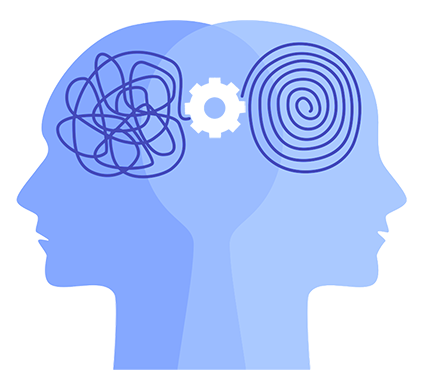Dialectical Behaviour Therapy (DBT) is the brainchild of Marsha Linehan as a framework based on Cognitive Behaviour Therapy and has specific protocols that work with neurodivergent individuals. The third wave CBT program assists with the complexity of suicidal ideation and relationship difficulties due to borderline personality disorder (BPD). Through her lived experience of BPD, she has created a model of intensive therapy through specific skills on distress tolerance, emotion regulation, interpersonal effectiveness, and mindfulness.
DBT has a modified version for autistic individuals offering tailored treatments to improve daily living. This intensive therapeutic model considers neurodivergent behaviour as different rather than incorrect or irrational (as in CBT), with the client as expert in their own lives offers self-determination and advocacy, further assisting those who may have a pathological demand avoidance (PDA) profile.
The integrated core processes help individuals develop skills for managing emotions, tolerating distress, improving relationships, and enhancing mindfulness. By practicing these skills, individuals can achieve greater emotional stability, resilience, and overall well-being.
1. Mindfulness:
Mindfulness is the practice of being fully present and aware in the moment. It involves observing thoughts, feelings, and sensations without judgment. In DBT, mindfulness helps individuals develop greater self-awareness and emotional regulation. It is foundational to all other DBT skills, as it enables individuals to recognise and understand their experiences more clearly.
2. Distress Tolerance:
Distress tolerance skills are designed to help individuals cope with and tolerate distressing situations and emotions without resorting to harmful behaviors. These skills include techniques such as distraction, self-soothing, improving the moment, and radical acceptance. The goal is to manage crises and endure pain in a healthy way.
3. Emotion Regulation:
Emotion regulation involves understanding and managing intense emotions. DBT teaches individuals how to identify and label emotions, reduce emotional vulnerability, and increase positive emotional experiences. Skills in this area include checking the facts, opposite action, and problem-solving. Effective emotion regulation helps individuals respond to emotions in a balanced and constructive manner.
4. Interpersonal Effectiveness:
Interpersonal effectiveness skills focus on improving relationships and communication. These skills help individuals assert their needs, set boundaries, and maintain self-respect while interacting with others. Techniques include DEAR MAN (Describe, Express, Assert, Reinforce, Mindful, Appear confident, Negotiate), GIVE (Gentle, Interested, Validate, Easy manner), and FAST (Fair, Apologies, Stick to values, Truthful). These skills enhance the ability to build and maintain healthy relationships.
5. Walking the Middle Path:
Walking the middle path involves finding a balance between acceptance and change. It emphasises the importance of dialectical thinking, which means recognising that two seemingly opposite things can both be true. This process helps individuals avoid extreme thinking and behaviors, promoting a more balanced and flexible approach to life.


